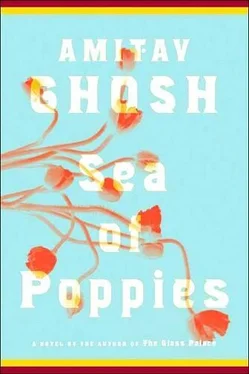hoga (*The Barney-Book): 'This word is a fine illustration of the changes that occur when an expression crosses from Hind. to English. The Hind. original ho-ga is usually employed to mean "will happen" or "will do". In English, on the other hand, the word is almost always used in conjunction with a negative participle, to imply strong disapproval. Thus was a notoriously starchy
BeeBeeheard to exclaim, on finding her husband in the arms of a Rum-johnny: "Not in my bichawnadear; just won't hoga." '
+hong: 'In southern China this word was applied indifferently, in English, to a certain kind of trading establishment, a company of merchants, a set of buildings, and even to cer tain boats kept by merchants: hong-boat'.
+hookum: 'The Laskari word for "command".'
hubes!/habes! (*Roebuck): This was the Laskari equivalent of the English nautical hookum, 'heave', and Neel was so struck by Roebuck's notes on this term that he copied them down verbatim: '[When issuing this command] sometimes a little abuse is necessary; as for instance "Habes sálá!" "Bahin chod habes!" or "Habes harámzuda" !'
+hurkaru/harcara: See dufter/daftarand chit/chitty.
hurremzad/huramzuda/harámzáda etc. (*The Glossary): See badmash.
istoop/istup (*Roebuck): 'I can still feel it between my fingers, that vile oakum, endlessly picking, picking, picking…' From the Portuguese estopa .
+jadoo/jadu: Magic, conjuring ('where-from the common usage, jadoo-gharfor Freemason's Lodge').
jalebi/jellybee: See laddu.
+jammah/jama: 'The only reason why this word may fail to achieve the same eminence as the compound, pyjama(literally "leg-clothing") is that it is too general, being applied to all clothing.' See also kameez.
+jasoos: Neel was intrigued by the English spellings of words related to this common Hind. term for 'spy' – jasoosy(spying) and jasooses(spies).
jaw/jao (*The Barney-Book): See chull.
jawaub (*The Glossary, *The Barney Book): 'This borrowing of the Hind. for "answer" was never a persuasive migrant, its function in English being limited to a single sense, which Barrère & Leland describe thus: "If a gentleman proposes to a lady and is refused he is said to have been juwaubed."'
+jemadar: 'In my youth, as I remember, this word designated the second-highest rank for a sepoy, following upon subedar/soubadar. But of late the usage has changed somewhat, and is often applied to bhistis, and also to some of the mysteries of toiletry.'
+jildi/jeldy/jaldi: The Oracle's recognition of this word appears to have been a cause of much jubilation, for one of my predecessors has noted the definition in full: 'Haste, as in phrases on the jildi , in a hurry, and to do or move a jildi '.
jillmill (*The Glossary): ' Bandookishutterwork'.
+joss: 'It was in Macao that I learnt the correct etymology of this term, which derives not from a Cantonese root, as I had imagined, but from the Portuguese Dios . Hence its use in all matters pertaining to worship: joss-stick, joss-house, joss-candle, and of course joss-pijjin, meaning "religion" (from which derives the usuage joss-pijjinmanto mean "priest").'
kalmariya (*Roebuck): 'A sail-emptying calm, the word being derived, or so Roebuck tells us, from the Portuguese calmaria .'
+kameez/kameeze: This word's entry into the caverns of the Oraclewould have amazed Neel, who believed that it was doomed to a pauper's grave. 'My reasoning rests on two pillars, the first of which is that the tunics that are known by this name could just as well be designated by a near-synonym, kurta. There are those who point out that a kameezeis a longer and more elaborate garment – but should it not then be described by the more euphonious term angarkha ? The scond reason why the word kameezeis unlikely to survive is because of the grave challenge posed by its near cognate, the English chemise . There are those who will object, no doubt, that kameezederives from the Arabic qamís , while the English chemise (like the Portuguese camiz ) is descended from the Latin camisia . No credence can be accorded to this argument, however, for the good reason that the Arabic qamís may itself be descended from the Latin. In any event there can be no doubt that kameezand chemise are close kin; nor can it be doubted that the latter is so rapidly usurping the territory of the former that the phrase "pyjama-chemise" may soon come to replace the name of the ensemble that is now known as the sulwaur-kameeze. Such a change is wholly to be welcomed: might not the notoriously pugnacious Afghan, for instance, undergo a beneficial change of temperament if he could be persuaded to abandon his prickly kameezin favour of the cooler and more flattering chemise ?'
karibat: The discovery of this word in *The Barney-Bookgave Neel the greatest pleasure for it had become, by the last years of his life, so obscured with disuse as almost to be archaic. It is clear from his notes that he remembered a time when this word, which joins the Tamil kari with the Bengali bhat 'rice', was commonly used in English, to mean 'an Indian meal'. In that sense it stood not just for 'curry-rice' as some might think, but was rather an English equivalent of such phrases as 'have you had your rice?' the meaning of which can best be expressed as 'have you eaten?' Although unable to recall with absolute certainty, he had a vague memory of even having heard people say, in this sense: 'have you karibatted?'
+kassidar/khasadar: See burkundaz.
ket (*Roebuck): Cat o'nine tails (but Neel notes that he often heard this most dreaded of chawbucks referred to as a koordum , which usage Roebuck corroborates, adding that it derives from the Portuguese cordão ).
+khalasi/classy: Although usually spelled as classy, this Bengali word for 'boatman' was generally used in a derogatory sense, to mean 'a low kind of person'. Neel would have been astonished to learn of its entry into the chambers of the Oracle.
+khidmutgar/kitmutgar/kistmutgar/kistmatgar etc.: 'The variety of English spellings for this word is truly astonishing and had led to many misconceptions. Among the many speculations about its origins the most febrile are those that attach to the variant kismat+gar. Some have suggested that the term originally referred to astrologers, a great number of whom were once employed by every household. It was even suggested to me once that the proper meaning of the word is "one who follows his master's kismat" ("Surely, sir," I could not help retorting, "such a person would be a budkismatgar ?"). In fact the term is the literal equivalent of the English servant in the sense of "provider of service".'
Читать дальше












